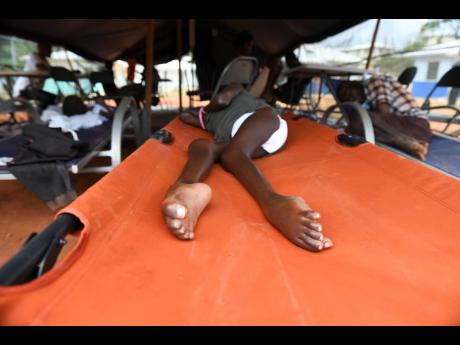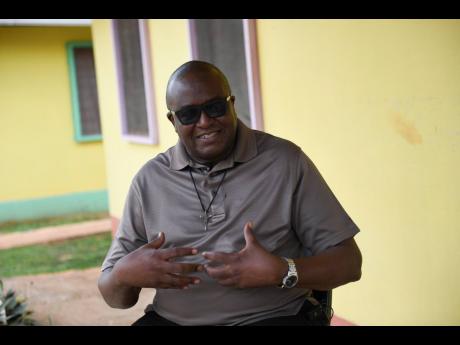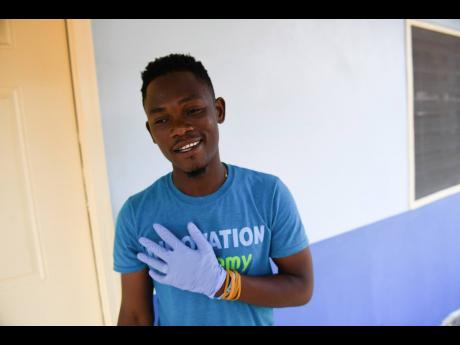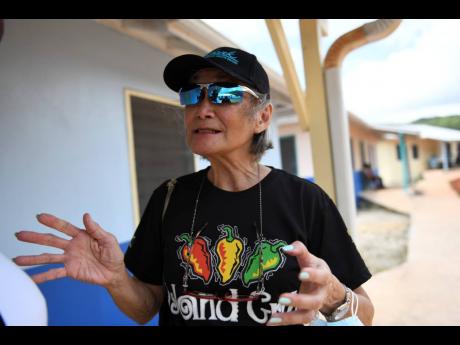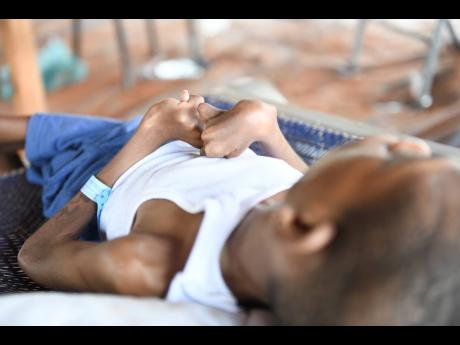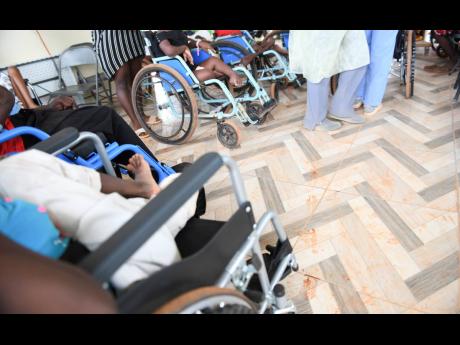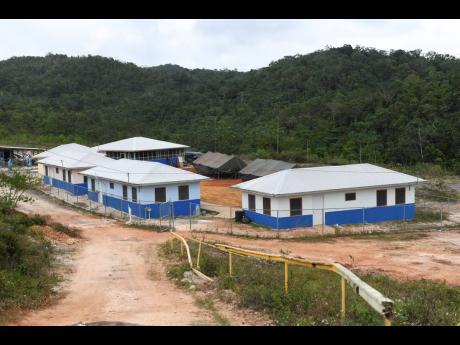Mission of mercy to village of love
How disabled Haitian orphans fled danger to a safe haven in Jamaica when a mustard seed bore fruit at Jacob’s Ladder
Nestled in the serene community of Haddon in Moneague, St Ann, is Jacob’s Ladder. A safe haven where modern-day disciples and angels care for scores of the most disadvantaged children and adults.
Located on 150 acres, it is the largest operation of the global Mustard Seed charity organisation in the Caribbean, Latin America, and Africa.
Within the commune are small villages with specially designed facilities that house some 165 residents with various abilities and disabilities. They are tended to by 145 caregivers.
This is where you will find over 70 Haitians who fled their crisis-riddled country by sea around midnight Tuesday, arriving in Jamaica on Thursday morning.
Among them are 15 caregivers and 59 at-risk children from HaitiChildren, a non-profit residential facility for the disabled.
The children are among the most vulnerable and are totally dependent on the kindness and love of others for their survival, which the caring staff at Jacob’s Ladder has every intention of providing.
“They need everything. They came with nothing. They were put on a boat and were on the seas for like 36 hours to get here,” Father Garvin Augustine, the man who heads Mustard Seed operations worldwide, told The Sunday Gleaner on Friday.
He shared that discussions to rescue the vulnerable Haitians were eight months in the making, after things began to spiral out of control in the French-speaking country.
But recent events accelerated the evacuation plans, as gang violence overrun the country that is now on the brink of collapse.
“We were preparing, but the window of opportunity was closing and when we got the greenlight from the [Jamaican] Government, there was a short time to get things together,” said Father Augustine, who was on the ground at Jacob’s Ladder on Friday when The Sunday Gleaner visited the facility.
“So they are here. They are welcomed with love. We have given them all that we have.”
But they have pressing needs, he noted, which include wheelchairs, sheets, towels, toothpaste, diapers and other disposables.
He said a day after they arrived, they were tired and perhaps a little sea sick, so they slept through the night. The following day some shared that it was the first in a very long time they did not hear gunshots going to bed or waking them.
‘BONSWA’
Curiosity was evident on the faces of many of the vulnerable Haitian children as The Sunday Gleaner team was given a tour of Jacob’s Ladder.
Most of them were wheelchair-bound.
There were wordless enquiries made through the eyes of some. A teenaged girl stared in the distance. One crawled on all fours. Two babies were without cribs. A boy about ten years old was sleeping under a tent.
A youngster, about 10 or 11 years old, wearing what was once a white t-shirt and blue jeans, the colours of both now changed to the deep red earth of St Ann, greeted us.
Displaying his name tag, he proudly walked over to The Sunday Gleaner team with a smile.
“Bonswa,” he said, the Haitian Creole for “good afternoon”.
In my best French I replied, “Alo. Je suis journaliste en Jamaique,” showing him my photo identification.
He laughed, his eyes widening either in surprise or at my odd combination of words.
Nonetheless, he repeated the word “Jamaique”, French for Jamaica, for the entire duration of our visit.
He shared that all he wanted was a “football” and “banan” (fried green plantains in a sweet sauce).
Looking around the facility, the sight of the children’s disabilities was indescribable. In addition, many are HIV-positive.
One doctor shared with The Sunday Gleaner the change observed in a young dehydrated girl, who “came back to life” after receiving nutrients from an IV drip.
The depth of love required to care for them is incalculable.
“Some call what we do here madness. Maybe. But it’s a beautiful type of madness,” Father Garvin shared with a smile.
‘A LOGISTICAL NIGHTMARE’
Explaining how Jamaica came about housing the children, Father Garvin said eight months ago, “We were contacted by HaitiChildren because of the situation with the escalating violence in Haiti, which affected their operations.”
He continued, “They could not get the children to the hospital. The violence affected food supplies coming in, and the situation was deteriorating rapidly. They reached out to us to see if we could take their children temporarily, for a period of three years, until things calm down there.”
However, that three years could become the rest of their lives, he indicated, as Mustard Seed will not repatriate them if the situation in the country worsens.
“It was a logistical nightmare to figure out how do you get 59 children and 15 caregivers across safely? In fact, it was over 60 children initially when we started talking, but unfortunately a few died before,” he said.
“The language barriers, the culture, the food, how do you physically transport them. We had to work out all those things.”
Thankfully, with the help of Jamaican authorities, they were able to accomplish the mission.
“We had to also get our own staff on board with it, because they would also have to care for these children,” he said.
“The physical facilities were also an issue. The village that they are living in now is an incomplete village. We actually stopped building since COVID, so there were these partially built structures that we had to finish in a short time to accommodate them.”
He said four more cottages are urgently needed to be constructed, each with a price tag of US$35,000, in order to keep them all together.
The children and staff of HaitiChildren share a strong family bond, so keeping them together and providing comfortable accommodation are the foremost worry for the Trinidadian who has made Jamaica his home for the last 28 years.
“I want to make it very clear that the HaitiChildren organisation will continue to fund the children here, so it’s not going to be an extra burden on the Jamaican government,” Father Garvin said.
“But that does not mean we don’t need extra funding, because there are those unforeseen costs, such as administrative and operational cost, of them being here. So we welcome any and all assistance.”
GRATEFUL TO JAMAICA
Christo Romain, one of the adult caregivers who arrived on Thursday, expressed gratitude to Jamaica.
He described how his country’s rapid decline into anarchy had put the lives of his HaitiChildren family at risk.
Romain, who was orphaned when his mother died when he was five years old, said HaitiChildren is the only home and family he knows.
“I came there when I was five years old. When I was 18 years, I got to study a lot of things. I am a chef and I cook very well and after a few months I worked as a chef and then, as a director of the organisation,” he told The Sunday Gleaner in his heavily accented Haitian tongue.
“Haiti is very critical now, because all the gangs have taken over and no one is safe. That’s the reason why they just want to move the children fast, to get to Jamaica. They probably get a better life in Jamaica, better doctors, better care,” said Romain, even as his voice betrayed some fears for the future.
“Now, for a start, it is very amazing. I like the way the caregivers helping us, how the Jamaicans are helping us, feeding the children, washing them. I wasn’t thinking it would be like that,” he said, expressing more gratitude.
He said the experience so far was fun, as much as it was hard for them, none of whom had ever travelled outside their country before. He said they were all trying to do their best to meet the needs of the children.
“The first day some were scared, not all of them. Some of them cannot walk or speak their feeling. But, we understand them. Me specially because I grew up with them. Those children are all my family. They are the only ones I know since five years old. My brother is also a caregiver, too,” said Romain, who does not know how long they will remain in Jamaica, but just wants life to be better for his countrymen and women.
PLEAS FOR HELP
The Haitians are now on health quarantine for two weeks. Officials from the Ministry of Health were observed at the facility on Friday carrying out checks.
Also there were members of corporate Jamaica, among them Island Grill’s founder Thalia Lyn and husband, Michael.
Lyn is also chairman of the NCB Foundation and a director of the Mustard Seed community, which runs Jacob’s Ladder.
“I am just here to give support. I met some of the guys who work in the operation last night and they put themselves in danger to bring the children here and when you hear the stories, I said I need to come down here today,” the businesswoman and philanthropist told The Sunday Gleaner.
“I said I can’t be just working in the back and hiding. Let me just come and show my support.”
She noted that, “It was a monumental operation to get the place ready to receive them and everybody joined hands in getting it done. This is such a masterpiece of execution of plan, and I just say, boy, this is my Jamaica and we all have to come together and help, because we can’t turn our backs on disabled children. We work with them here in Jamaica but this brought me to tears.”
According to her, many of Jamaica’s large corporate entities, as well as individuals, have given generous support. Through Island Grill, meals were provided for the visitors on Thursday and Friday.
Lyn is hoping to drum up as much support as possible to assist.
“We know the kind of care they need and we are going to depend on corporate Jamaica for things like … well, everything. Pharmaceuticals, soaps, hygiene care … everything. So I am going to come calling,” she promised.
Romain closed with the hopes and dreams for his family.
“I hope everything is going to be better, better than Haiti,” he said.

